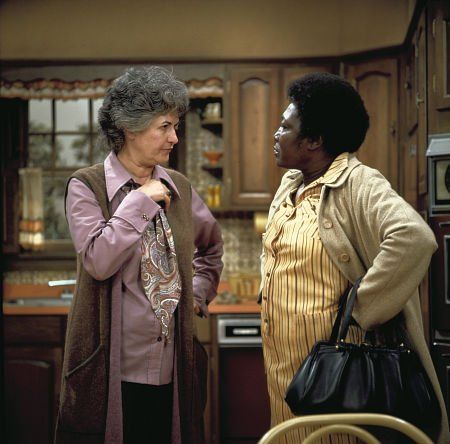
Maude was the first spin-off in the fictional comedy universe of All In The Family. The sitcom was centered around the character Maude Findlay who was Edith Bunker‘s cousin. Edith was the main character and wife of Archie Bunker in All In The Family.
The need of the character came in demand to oppose Archie Bunker in the second season because Maude was a feminist and liberal woman, totally contrary to conservative and racist Archie. After Maude received popularity on her debut appearance in All In The Family, her character got her own sitcom which successfully ran for six seasons.
I do not have much knowledge about the significance of feminism in American television history but if this sitcom wasn’t the first then at least this was the first which substantially advocated women’s liberty and freedom of choice.

Just like All In The Family, Maude had many important topics to raise like a satire on high socialites who hesitate to raise funds, daughter Carol Traynor not getting a job because it was not fit for women, child behavioral issue when grandson Phillip gets angry with mother for being more moved towards her new boyfriend, or himself inviting his female friend when the family goes to the party, and many more.
And there was one topic that raised the eyebrows, the episodes “Maude’s Dilemma Part 1 & 2” which spoke highly in favor of abortion when 47-year-old Maude gets pregnant. It was shocking and because personally, I am strictly against abortion, I felt it was very irresponsible of the writers and producers to motivate instead of discouraging. But my opinion aside, I also believe that talking about the pros and cons of abortion in the year 1972 in a comedy show was way ahead of its time.

Maude will also be remembered for the introduction of the character Florida Evans, the Afro-American maid in the Findlays. The writing of Florida’s character-depth was astonishing and got a lot of weight in her supporting role. Her side of the story was so appealing that Florida got her own sitcom, Good Times which also was extremely successful.
Another significance of this show which immensely won my heart was on two occasions centering around the couples Maude and Walter, both occurring at the beginning of the fourth and fifth season. The first was when their relationship is at the edge of breaking when Walter decides to leave if Maude intends to run the election.
The second one was more serious and heart-boiling when Walter goes bankrupt. The writers brought attention from the humor in the rich family that people can suffer and can feel the pain of continuously going helpless. This dark element was badly missing in All In The Family and later in The Jeffersons (second spin-off).

Maude also was pretty careful in the pairing and relationship between Maude and Walter. There had been dozens of moments when things looked bad but somehow any of the two managed to hold and maintain their bond. Walter’s drinking issue got the tone of attention especially when he slaps her, something which is rare to be watched in sitcoms. And a few I wrote above and many more to enjoy.
I miss an element that is quite common now, crossovers. Not a single appearance of cousin Edith Bunker in Maude was bizarre. Not a single time the Bunkers came to meet the Findlays in six seasons which is quite strange. Same network, same producer, same universe, how come All In The Family and Maude were not connected. The same discrepancy in The Jeffersons, not once the Bunkers showed up in 11 seasons as Edith was Louise Jefferson‘s dear friend and favorite neighbor.
Anyway, Maude is one of the most popular sitcoms of the 1970s and a significant step in feminism and liberalism. Beatrice Arthur, who played Maude, was an outstanding actress. So are the other actors in the main characters. Maude was the platform for most of them. Rue McClanahan (Maude’s friend, Vivian Harmon) got The Golden Girls, Conrad Bain (Walter’s friend, Arthur Harmon) got Different Strokes, Adrienne Barbeau (Maude’s daughter) became the voice of Selina Kyle/Catwoman in Batman cartoons.
Recommended to the audience who are willing to watch quality humor and exceptional comic writing.



























